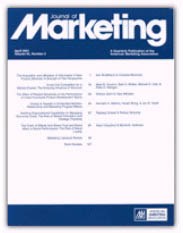
\van Everdingen\, Y., Hariharan, V. and Stremersch, S. (2019). Gear Manufacturers as Contestants in Sports Competitions: Breeding and Branding Effects Journal of Marketing, 83(3):126--144.
-
Affiliated authorsYvonne van Everdingen, Stefan Stremersch
-
Publication year2019
-
JournalJournal of Marketing
Several manufacturers make substantial investments to compete in sports contests, using the gear they develop and market. However, no systematic analysis of the breeding (i.e., innovation) and branding (i.e., marketing) returns from such investments exists. In this study, the authors conceptualize and empirically estimate the breeding and branding returns that such manufacturers obtain. The authors gather data for 30 car brands of 16 manufacturers over the period 2000–2015 regarding their participation, spending, and performance in Formula One championships, annual patent citations, and research-and-development (R\&D) budgets as well as monthly vehicle registrations, advertising expenditures, and Formula One TV viewership. The authors find that only gear manufacturers with relatively high levels of R\&D spending obtain a positive and significant breeding return from competing in sports contests. While most brands obtain positive branding returns, the lower the level of advertising spending for the brand, the greater the branding returns they obtain from competing in these contests. Thus, research-intense (compared with advertising-intense) gear manufacturers have more to gain from competing in sports contests. These findings can help guide manufacturers in budget allocation decisions on sports competitions, R\&D, and advertising.